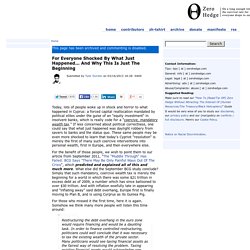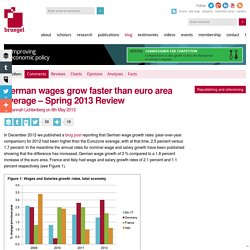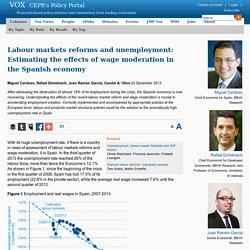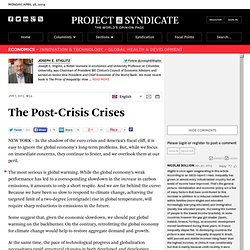

The Next Crisis – Mark your calendar. The Next Crisis – Mark you calendar The date will be on or about September 30th.

The issue will be the need to pass a Continuing Resolution by the House. For more than 850 days the US has gone without a budget. The House passed one not long ago; the Senate tabled it. The Administration has not offered up one either. The last time we went through a vote on a continuing resolution was just four months ago.
In Deutschland wird das Wesen der Eurokrise nicht verstanden « Never Mind t. So einfach, wie es sich die Deutschen machen, ist es nicht: Angela Merkel während ihres Spanien-Besuchs, 6.

September 2012. Chart of the day: Euro nations with largest deterioration in fiscal situati. For Euro Investors, Time to Check the Fine Print - WSJ.com. For Everyone Shocked By What Just Happened... And Why This Is Just The Begi. Today, lots of people woke up in shock and horror to what happened in Cyprus: a forced capital reallocation mandated by political elites under the guise of an "equity investment" in insolvent banks, which is really code for a "coercive, mandatory wealth tax.

" If less concerned about political correctness, one could say that what just happened was daylight robbery from savers to banks and the status quo. These same people may be even more shocked to learn that today's Cypriot "resolution" is merely the first of many such coercive interventions into personal wealth, first in Europe, and then everywhere else.
Flushdoc.aspx.
Does the Euro Have a Future? by George Soros. The euro crisis is a direct consequence of the crash of 2008.

When Lehman Brothers failed, the entire financial system started to collapse and had to be put on artificial life support. This took the form of substituting the sovereign credit of governments for the bank and other credit that had collapsed. At a memorable meeting of European finance ministers in November 2008, they guaranteed that no other financial institutions that are important to the workings of the financial system would be allowed to fail, and their example was followed by the United States. Angela Merkel then declared that the guarantee should be exercised by each European state individually, not by the European Union or the eurozone acting as a whole. Why I remain a pessimist on Europe’s solvency - FT.com. Europäische Lohnkoordinierung oder nationale Währungen – entscheidet euch! Mit der Auflösung der nationalen Währungen und Einführung des Euro hat man bewusst Markt-mechanismen außer Kraft gesetzt.

Bruegel - The Brussels-based think tank. In December 2012 we published a blog post reporting that German wage growth rates (year-over-year comparison) for 2012 had been higher than the Eurozone average, with at that time, 2.5 percent versus 1.7 percent.

In the meantime the annual rates for nominal wage and salary growth have been published showing that the difference has increased; German wage growth of 3 % compared to a 1.8 percent increase of the euro area. France and Italy had wage and salary growth rates of 2.1 percent and 1.1 percent respectively (see Figure 1). German wage growth rates have been increasing over the previous 8 years, except for a sharp decrease to 0.4 percent in 2010 when Germany had one of the lowest rates in Europe (see Figure 2). When looking at the net wage increase and taking inflation into account the picture becomes even more pronounced. More on the European Bank Bailout. Cross-posted from Credit Writedowns Overnight, a group of us were exchanging e-mails on the recent coordinated central bank action to provide European banks the funding being denied them by the markets.

By VoxEU.org Some view the improvements in current accounts for Greece, Italy, Portugal, and Spain as short-lived – the result of a temporary compression of import demand that is likely to be reversed as the recession eases.

This column argues the contrary, based on the fact that their improving trade balances reflect better export performance. This development points toward a fundamental stabilisation of the competitiveness of these economies. By Raphael Auer Current-account (CA) rebalancing is a necessary step for the Southern EZ countries to overcome their debt and external balance of payments crises.1 Figure 1 documents the impressive speed and magnitude of the southern EZ’s CA rebalancing. Miguel Cardoso, Rafael Doménech, Juan Ramón García, Camilo A.

Ulloa 20 December 2013 With its huge unemployment rate, if there is a country in need of assessment of labour markets reforms and wage moderation, it is Spain. In the third quarter of 2013 the unemployment rate reached 26% of the labour force, more than twice the Eurozone’s 12.1%. Antonio Fatas. Flushdoc.aspx. For Everyone Shocked By What Just Happened... And Why This Is Just The Begi. The Post-Crisis Crises by Joseph E. Stiglitz - Project Syndicate. Exit from comment view mode.

Click to hide this space NEW YORK – In the shadow of the euro crisis and America’s fiscal cliff, it is easy to ignore the global economy’s long-term problems. But, while we focus on immediate concerns, they continue to fester, and we overlook them at our peril. The most serious is global warming. While the global economy’s weak performance has led to a corresponding slowdown in the increase in carbon emissions, it amounts to only a short respite. Some suggest that, given the economic slowdown, we should put global warming on the backburner. At the same time, the pace of technological progress and globalization necessitates rapid structural changes in both developed and developing countries alike. Euro zone lending falls for 8th month. Europe faces week of challenges in debt crisis. 2013 Financial Crisis deepening. Three Charts Explaining the Financial Crisis.
By www.thetrader.se So what is going on in the markets? We had Fukushima, but that was all good for the economy, because we had to rebuild Japan (with printing money).Then those guys in MENA wanted freedom (and lower food prices). NATO started Operation bomb Libya to stone age, but that was all good, that needs rebuilding too. Greece suddenly discovered it had no money left. Ireland joined, and Spain, Italy etc are still knocking on the same door. Crisis today. Phantom Crises (Wonkish) - NYTimes.com. Simon Wren-Lewis is puzzled by a Ken Rogoff column that sorta-kinda defends Cameron’s austerity policies. His puzzlement, which I share, comes at several levels. But I want to focus on just one thing: Rogoff’s assertion that Britain could have faced a southern Europe-style crisis, with a loss of investor confidence driving up interest rates and plunging the economy into a deep slump.
As I’ve written before, I just don’t see how this is supposed to happen in a country with its own currency that doesn’t have a lot of foreign currency debt – especially if the country is currently in a liquidity trap, with monetary policy constrained by the zero lower bound on interest rates. Counterpoint’s visual tool for comparing populists at the European election. [UPDATE 5/6/14: upon receiving feedback, we have revised our rating for the 5 Star Movement from green to amber on the ‘Hostile to representative democracy’ dimension. the Movement’s vision of democracy is hard to place, but it is clear that it opposes representative democracy in its current form in Italy – with leader Beppe Grillo stating, for instance, that “I will never again ask for anything from this political class.
To change [Italy], politicians have to be replaced by the citizens”.] A range of populist parties are tipped to perform well at this week’s European elections. For Euro Investors, Time to Check the Fine Print - WSJ.com. Investors flock to buy ESM debt. Investors take hammer to ‘Teflon’ euro - FT.com. George Dorgan sur Twitter : "U decide: #Italy got unproductive since 2000 or Italy was productive in 2000& did not go in spending (akaGDP) bubble? Europe’s Banking Union starts on an encouraging note. Telesniuk Sunday, October 26 was D-Day for Europe’s banks: at noon in Frankfurt, the European Central Bank (ECB) announced the results of its “comprehensive assessment” of the euro area’s 130 largest banks, including an Asset Quality Review (AQR) and stress tests. Simultaneously in London, the European Banking Authority (EBA) announced the results of these stress tests for a larger sample of banks, including the largest banks headquartered in the EU but outside the euro area.
Tweet This. Bruegel sur Twitter : "So far apart and yet so close: Should #ECB care about #inflation differentials? Deflation Isn't What's Holding Europe Back. As the European Central Bank gets ready for quantitative easing, overriding German arguments that buying government debt creates moral hazard in debt-laden countries, it is reacting to the threat of deflation. Yet slow-growing prices aren’t at the heart of what ails the euro area, and QE won’t fix the deeper problems that are. Herabgestuft: Zu hohe Risiken belasten französische Banken - Europas Schuld.